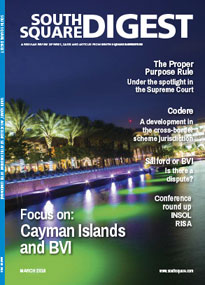

Mark Arnold QC explores the differences of approach adopted in England and Wales (Salford Estates) and in the BVI (C-Mobile Services Limited v Huawei Technologies Co Limited and Jinpeng Group Ltd v Peak Hotels and Resorts Limited) to the effect of arbitration clauses on winding up petitions.
The Boat Race dispute
Two men have an argument over who won the Boat Race in a particular year – but not 1877. It has been said that the fact that it can be easily and immediately demonstrated beyond any doubt that the one is right and the other wrong does not and cannot mean that that dispute did not in fact exist. Because one man can be said to be indisputably right and the other indisputably wrong does not entail that there was therefore never any dispute between them.1 But is that enough when a creditor petitions for the winding up of a company on the basis of an unpaid debt arising out of an agreement by which the parties have agreed to submit their disputes to arbitration? Surprisingly, it appears the answer will differ according to whether the creditor petitions in England & Wales or in the BVI. In this article, I explore why that is so, and ask which approach is to be preferred.
Mandatory stay for arbitration
One of the general principles on which the provisions of the Arbitration Act 1996 are founded is that the parties should be free to agree how their disputes are to be resolved, subject only to such safeguards as are necessary in the public interest (s 1). Accordingly, the 1996 Act provides for a mandatory stay of legal proceedings in circumstances where the parties have chosen to submit their disputes to arbitration. S 9(1) provides that: A party to an arbitration agreement against whom legal proceedings are brought (whether by way of claim or counterclaim) in respect of a matter which under the agreement is to be referred to arbitration may (upon notice to the other parties to the proceedings) apply to the court in which the proceedings have been brought to stay the proceedings so far as they concern that matter. S 9(4) then says: On an application under this section the court shall grant a stay unless satisfied that the arbitration agreement is null and void, inoperative, or incapable of being performed. “Dispute” is widely defined to include “any difference” and “legal proceedings” means civil proceedings in the High Court or a county court: s 82(1). It has been established that there is a dispute for the purposes of the 1996 Act when a claim is simply not admitted. Thus the mandatory stay provisions of s 9 are engaged even if, absent an arbitration agreement, the claimant could have obtained summary judgment: Halki Shipping Corpn v Sopex Oils Ltd. 2 Where s 9 applies, therefore, the legal proceedings will be stayed without any investigation into the underlying merits of the case, as long as the claim is not admitted such that there is a dispute to be determined by arbitration.
Private disputes
S 9 does not apply to all disputes. It applies only to disputes which the parties have agreed to submit to arbitration. Even then, however, it applies only to private disputes between them: it does not permit the parties to agree between themselves to oust what would otherwise be in the exclusive jurisdiction of the court. This distinction was highlighted by the Court of Appeal in Fulham Football Club (1987) Ltd v Richards. 3 In that case, the petitioner sought relief under s 994 of the Companies Act 2006 (unfair prejudice) in the form of an injunction restraining Sir David Richards from acting as an unauthorised agent or from participating in any way in negotiations regarding the transfer of players. The Court of Appeal considered that the dispute was essentially a private one between the parties and that there was nothing unsuitable for determination by arbitration, and stayed the proceedings under s 9.
Non-private disputes and class remedies
Where the dispute qualifies not as a private dispute but one which is a matter within the exclusive jurisdiction of the court, however, s 9 does not apply. Thus it has no application, for example, to a petition to wind up a company on the ground that it cannot pay its debts within the meaning of s 123 of the Insolvency Act 1986.The Court of Appeal gave several reasons for this in Salford Estates (No. 2) Ltd v Altomart Ltd (No. 2), 4 namely:
- Such a winding up petition is not a claim for payment; rather it is a request for the court to exercise its discretion to wind up the company, which is a class remedy for the benefit of all creditors of the company. ·
- To read s 9 as conferring on a debtor the right to a nondiscretionary stay of such a winding-up petition would strike at the heart of the court’s jurisdiction and discretionary power to wind up insolvent companies in the public interest. It is highly improbable that Parliament, without expressly saying so, intended that the 1996 Act should oust the discretion of the court to wind up insolvent companies.
- This reasoning applies whether the question to be determined on the winding up petition is whether the debtor cannot pay its debts generally, or whether it cannot pay a particular debt.
Consistency
So far so good. There is general agreement with the proposition that the statutory automatic stay provisions in favour of arbitration do not operate to prevent a petition to wind up a company on the ground that it cannot pay its debts, which is a class remedy: see in Australia, Community Development Proprietary Ltd v Engwirda Construction Co; 5 in Singapore, Re Sanpete Builders (S) Pte Ltd; 6 in the BVI, C-Mobile Services Ltd v Huawei Technologies Co Ltd 7 and Jinpeng Group Ltd v Peak Hotels and Resorts Ltd. 8
The exercise of the court’s discretion to wind up an insolvent company
But how then is the court to exercise its discretion whether to wind up the debtor company on the basis that it cannot pay its debts? It is well-settled that, although the power to wind up is discretionary, a creditor whose debt is payable and unpaid is entitled to a winding up order ex debito justitiae. Conversely, it is just as well settled that the court will refuse to exercise its winding up jurisdiction when it is satisfied that the petition debt is disputed in good faith on substantial grounds. Although long settled, these are rules of practice, to which the court adopts a flexible approach: Re Claybridge Shipping SA9. In that case (decided in 1981), Lord Denning MR also said: 10 “I entirely agree that a petition for winding up should not be used as the means of getting in a debt which is bona fide disputed on substantial grounds – on which the company would get unconditional leave to defend. But I think the Companies Court should be able to look into the bona fides of the defence. If it is obviously a ‘put-up job’ – or if it is so insubstantial that a Queen’s Bench master would only give conditional leave to defend – then I should think the petition to wind up should stand. In short I think that the Companies Court should keep the remedy flexible – for the sake of all creditors – so that the assets may not be disposed of or removed by the company before there is a chance of dealing with them.” Chadwick J said much the same thing, after reviewing the authorities, in Re a Company: 11 “In my view those authorities, and in particular the authorities of the Court of Appeal to which I have referred, make it clear that the general rule under which this court refuses to entertain a petition founded on a disputed debt applies only where the dispute is a genuine dispute founded on substantial grounds; and does not preclude this court from determining – or entitle this court to decline to determine – the question whether or not there are substantial grounds for dispute. Indeed, in the passage from the judgment of Oliver LJ [in Claybridge] he pointed out that the court necessarily has to take a view whether on the evidence there really is substance in the dispute which is raised by the alleged debtor.” This remains the position in England & Wales: see Tallington Lakes Ltd v Ancasta International Boat Sales Ltd. 12
Salford Estates
- Well, if s 9 does not apply to a creditor’s winding up petition, such that the court remains in control of its discretion whether to accede to the request to wind up the company, it surely must follow that it will do so by reference to these long-established rules of practice, without further reference to the 1996 Act or the policy behind it? In other words, it will – won’t it? – ask itself whether the debt is disputed in good faith on substantial grounds and, if it is not, make the winding up order. Quite so, said Bannister J in Alexander Jacobus de Wet v Vascom Trading Ltd. 13 The contractual agreement requiring disputes to be referred to arbitration will apply only if the court concludes that the debt is indeed disputed in good faith on substantial grounds. Er, no, said the English Court of Appeal in Salford Estates. The position is not that straightforward, as the Chancellor explained at [39]-[41]:
- The court retains its discretionary power to wind up an insolvent company (s 122(1) of the Insolvency Act 1986). · It is entirely appropriate that the court should exercise its discretion consistently with the legislative policy embodied in the 1996 Act.
- It would be anomalous for the Companies Court to conduct a summary judgment type analysis of liability for an unadmitted debt on which the winding up petition is founded (ie to ask itself whether it is disputed in good faith on substantial grounds), when the petitioner has agreed to refer any dispute relating to that debt to arbitration.
- Otherwise, parties to an arbitration agreement would be tempted, as a standard tactic, to bypass the arbitration agreement and the 1996 Act by presenting a winding up petition.
- That would be entirely contrary to the parties’ agreement as to the proper forum for the resolution of such an issue, and to the legislative policy of the 1996 Act. · In exercising its discretion under s 122(1)(f) of the 1986 Act, it was right for the court to dismiss or stay the petition so as to compel the parties to resolve their dispute over the debt by their chosen method of dispute resolution rather than require the court to investigate whether or not the debt is disputed in good faith on substantial grounds.
- This is the position save in “wholly exceptional circumstances” which the Court of Appeal found it difficult to envisage, and of which they accordingly provided no examples. In other words, the Boat Race dispute will suffice, and the petition must go. To an interested observer, there is something illogical about the Court of Appeal’s approach. On the one hand, s 9 does not apply and so there can be no automatic stay just because the parties have chosen to submit their disputes to arbitration. On the other hand, in exercising its remaining discretion whether to wind up the company on the ground it cannot pay its debts, the court should nevertheless act consistently with the policy of the 1996 Act. As explained by the Court of Appeal, that means refusing to ask itself or to decide whether the petition debt is disputed in good faith on substantial grounds, and granting a stay (or dismissing the petition) save in wholly exceptional circumstances. The automatic stay under s 9 does not apply; but the discretion under s 122(1)(f), shorn of its substance, will operate instead to bring the petition to a standstill, effectively automatically. Rather than imposing an automatic stay, the policy of the 1996 Act operates instead to achieve the same result, albeit indirectly:
- by rendering the winding-up discretion one that is exercisable in only one way (absent wholly exceptional circumstances);
- by displacing the long-established rules of practice of the Companies Court; · by removing from the debtor company the burden of demonstrating that the debt is disputed in good faith on substantial grounds;
- by imposing on the petitioner the additional burden (which the Court of Appeal cannot envisage being discharged) of establishing wholly exceptional circumstances instead;
- without Parliament having expressly said so. How can that be, one might ask, if Parliament meant to leave the court’s exclusive discretionary jurisdiction to wind up insolvent companies in the public interest untouched by an agreement between the parties submitting their private disputes to arbitration? Salford Estates has been followed at first instance (as, of course, it had to be) in Eco Measure Market Exchange Ltd v Quantum Climate Services, 14 but in that case it was clear anyway that the debt was disputed (and not merely not admitted). Salford Estates has also been referred to with approval by the Court of Appeal itself in HMRC v Changtel Solutions Ltd, 15 although what the CA took from it was simply that “the fact that the parties had agreed an alternative method of dispute resolution was, as a matter of discretion, relevant to whether it was appropriate to allow the petitioner to proceed with a winding up before having it determined that the debt was due by the method that it had agreed” without reference to the manner in which that discretion was to be exercised in the absence of wholly exceptional circumstances. So understood, the CA in Changtel considered Salford Estates supported its conclusion that the Companies Court should not have treated the existence of the tax appeal or the decision of the tax judge to extend the time for that appeal (on the basis he was not satisfied that the appeal was without merit) as conclusive in favour of dismissal of the petition, but should have considered (as usual) whether the debt was disputed in good faith on substantial grounds. The CA itself conducted that exercise, concluded it was not and wound the company up. Whatever may be the merits of the Salford Estates approach, it is not one that has so far commended itself to appellate courts elsewhere in the common law world, at least not unreservedly so. Two recent decisions of the Eastern Caribbean Supreme Court, Court of Appeal call for comment.
C-Mobile Services Ltd v Huawei Technologies Co Ltd
In the C-Mobile case, the appellant debtor company had applied to set aside a statutory demand, but had been unsuccessful. The BVI court had refused because it was not satisfied the debt was disputed in good faith on substantial grounds. The debtor company subsequently applied to stay the creditor’s application to appoint liquidators, on the basis that the agreement under which the debt arose contained an arbitration clause. At first instance, the company’s application was dismissed, as the commencement of winding up proceedings did not engage the arbitration clause. The company’s appeal was dismissed. As stated above, the appellate court agreed with the English Court of Appeal in Salford Estates that the arbitration stay did not extend to winding up proceedings. While expressing full agreement with the sentiments expressed by the Chancellor in Salford Estates at [39]- [41], the appellate court noted that the BVI court had already investigated the question whether the debt was disputed in good faith on substantial grounds (on the application to set aside the statutory demand); had decided that it was not subject to such a dispute; and the appellate court agreed with that finding. Evidence of a referral to arbitration would be “a factor” to be considered in the exercise of the discretion whether to set aside the statutory demand, but it was not open to the debtor company to argue now that the application to wind up should be dismissed merely on the basis that the debt was not admitted, rather than disputed in good faith on substantial grounds: [15]-[16]. The appellate court drew careful attention to the separate and distinctly different tests: the test whether a stay for arbitration should be imposed depended simply on whether the debt was disputed in fact “irrespective of how unlikely would be [the debtor’s] success in defending it”, whereas the winding up discretion involved considering whether the debt was disputed in good faith on substantial grounds: [16] and [22]. Although it was accepted an agreement to refer disputes to arbitration could be a factor in the exercise of the windingup discretion, there was no suggestion that it would change the nature of that discretion or the manner in which it was to be exercised.
Jinpeng Group Ltd v Peak Hotels and Resorts Ltd
In the subsequent Jinpeng case, a winding up petition was presented on the just and equitable basis for the purposes of which the petitioner had to establish standing to petition as a creditor. The East Caribbean Supreme Court, Court of Appeal again considered what the Chancellor had said in paras [39]-[41] of Salford Estates. They noted (at [47]) that the position outlined by the Chancellor “comes close to the automatic stay position which is now firmly a part of the learning in connection with” the mandatory stay for arbitration. “[The Chancellor] is saying in very clear terms that a winding up application based on a debt that is covered by an arbitration agreement will be stayed unless there are exceptional circumstances.” The appellate court then roundly rejected the Chancellor’s approach. A Boat Race dispute will not suffice: “However, I do not think that a creditor should have to prove exceptional circumstances. This Court’s judgment in the C-Mobile case sets out and distinguishes the BVI court’s statutory jurisdiction to wind up a company based on its inability to pay its debts as they fall due unless the debt is disputed on genuine and substantial grounds. This principle is too firmly a part of BVI law to now require a creditor exercising the statutory right belonging to all the creditors of the company to apply to wind up the company, to prove exceptional circumstances to establish his status to apply. The statutory jurisdiction [to wind up] is satisfied once the creditor is applying on the basis of a debt that is not disputed on genuine and substantial grounds.”The debt itself fell within the terms of the arbitration clause, and was being arbitrated between the parties, but it was not disputed in good faith on substantial grounds [49]. In the circumstances (including certain others which it is not necessary to mention here), the appellate court set aside the judge’s order, appointed provisional liquidators and restored the winding up application for further hearing.
Conclusion
The Court of Appeal in Salford Estates was right to be concerned about the risk that parties would be tempted, as a standard tactic, to bypass their arbitration agreement and the 1996 Act by presenting a winding up petition instead. It is in many respects akin to the risk that over-zealous creditors will be tempted, even in the absence of an arbitration agreement, to subject the debtor company to the rigours of the winding up process rather than establishing the debt (and with it their status as creditor) in ordinary civil proceedings first. The development of the rule of practice that the Companies Court will not wind up a company in circumstances where the petition debt is disputed in good faith on substantial grounds, with the additional penalty of an order to pay costs on the indemnity basis, has proved equal to the task of preventing, or punishing, the abuse of the process of the Companies Court. As the recent appellate decisions from the BVI show, it is more than capable of addressing the same potential abuse in circumstances where the parties are subject to an arbitration agreement. It is not necessary to denude the winding up jurisdiction of its discretionary status by requiring that it be exercised in one way in the absence of “wholly exceptional circumstances”: such inflexibility appears to be the very antithesis of a discretion, properly socalled. Nor is it necessary to alter in any way long-established rules of practice by which the Companies Court controls its own procedure, either by requiring the debtor company only to show that the debt is not admitted rather than that it is disputed in good faith on substantial grounds, or by requiring the petitioner to establish “wholly exceptional circumstances”. Which approach is to be preferred? In the real world, it depends who’s asking. Debtor companies might be expected to be happy to adopt the Boat Race dispute approach clearly favoured (though not expressly mentioned) by the Court of Appeal in Salford Estates. Unpaid creditors will be less enthusiastic: by the time arbitration has determined there is no substance in the non-admission of the debt, the debtor’s assets may be long gone, and with them the creditors’ hopes of payment
1/. Hayter v Nelson [1990] 2 Lloyd’s rep. 265, per Saville J at 268-9; considered by the CA in Halki Shipping Corpn. v Sopex Oils Ltd [1998] 1 WLR.
2/.[1998] 1WLR 726.
3/. [2012] Ch 333.
4/. [2015] Ch 589.
5/. (1969) 120 CLR 455.
6/. [1989] MLJ 393.
7/. Eastern Caribbean Supreme Court, Court of Appeal, 15 September 2015.
8/. Eastern Caribbean Supreme Court, Court of Appeal, 8 December 2015.
9/. [1997] 1 BCLC 572, per Oliver LJ at 578h-579f.
10/. [1997] 1 BCLC 572, at 575f-h.
11/. [1997] BCC 830.
12/. [2014] BCC 327, per David Richards J at [39]-[41].
13/. [2011] JBVIC.
14/. [2015] BCC 877.
15/. [2015] 1 WLR 3911.







![Brake & Anor v The Chedington Court Estate Ltd [2023] UKSC 29](https://southsquare.com/wp-content/uploads/2024/02/Brake-Anor-scaled-e1728649908896.jpeg)









